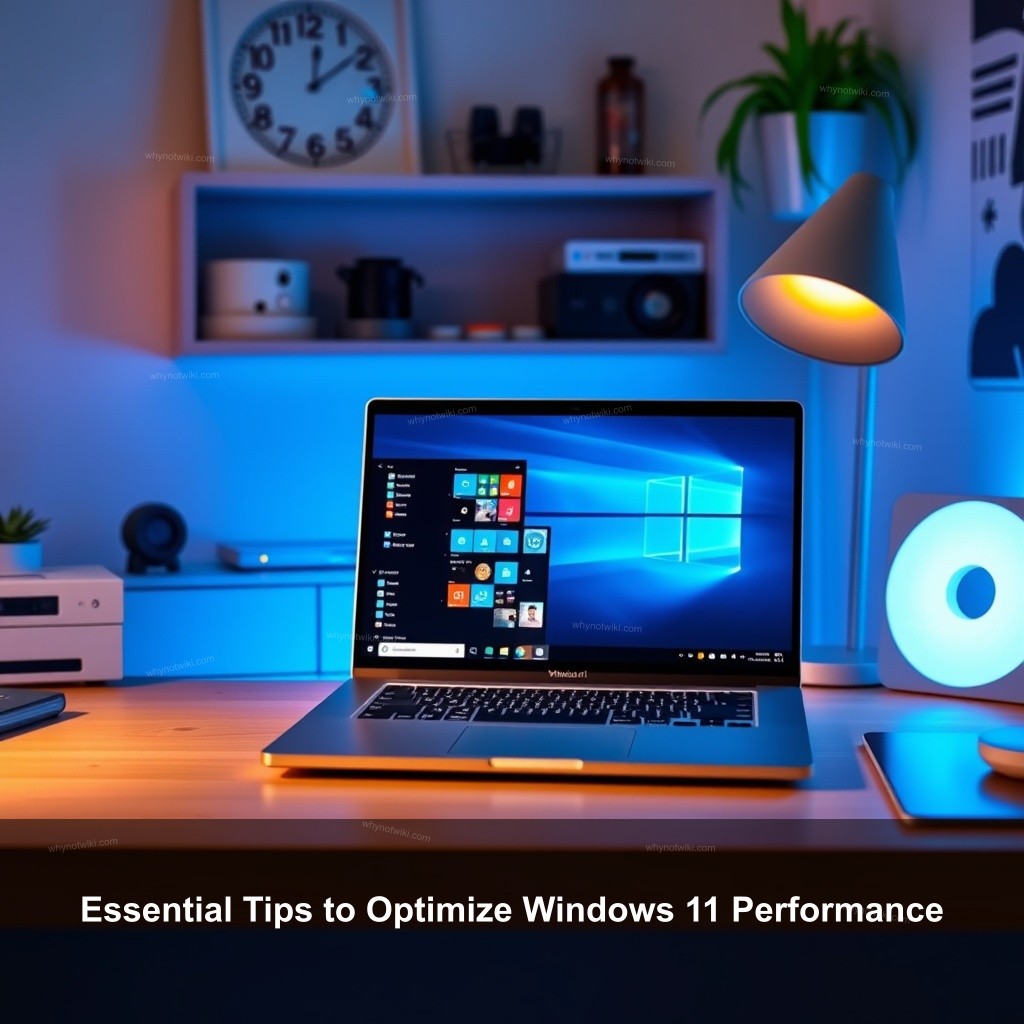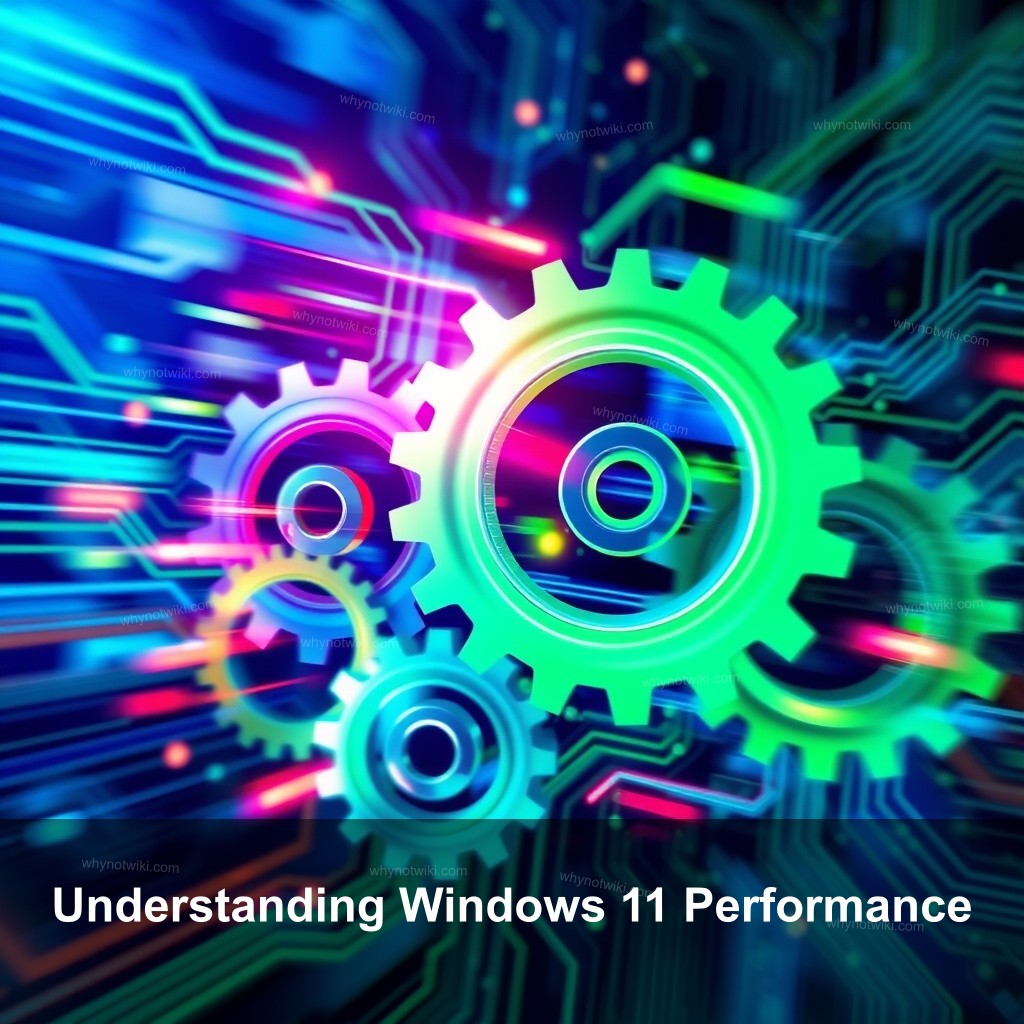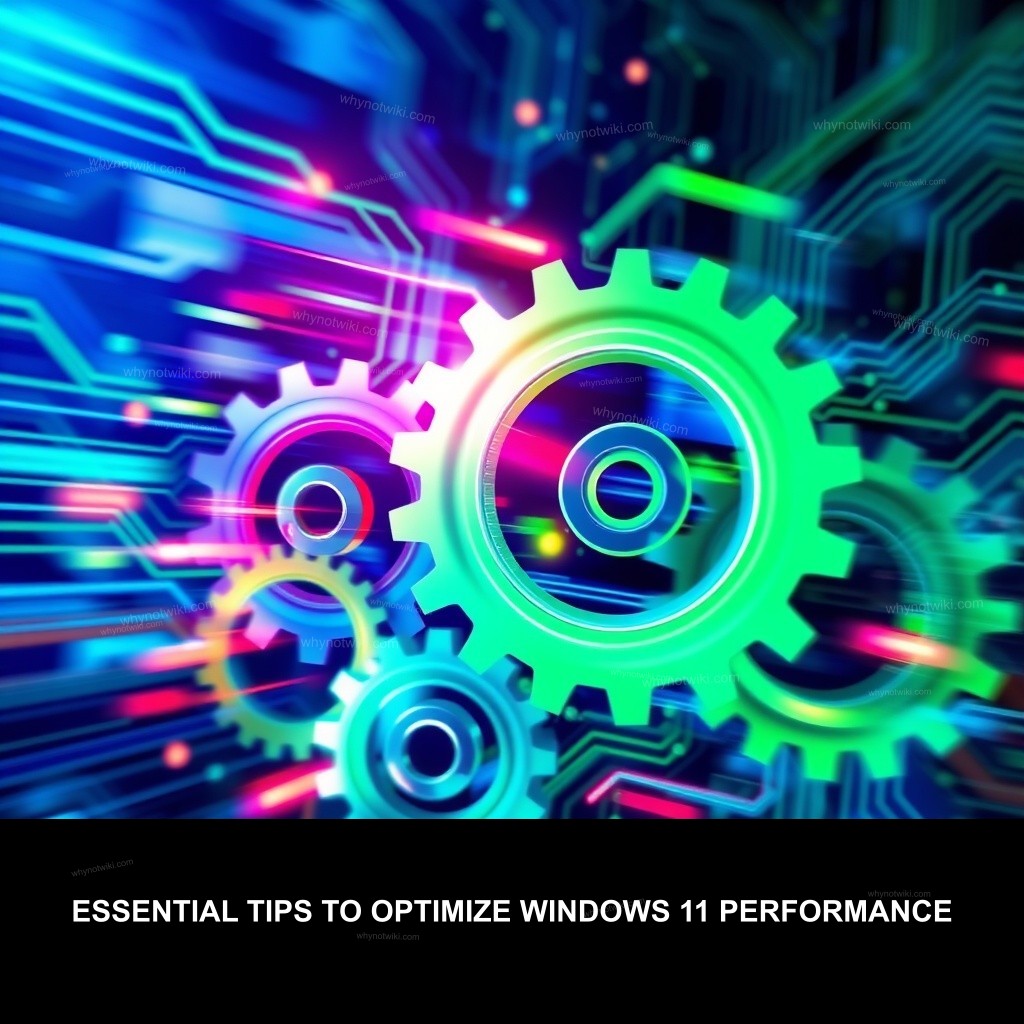Did you know that a few simple adjustments can significantly improve your Windows 11 experience? At WhyNotWiki, we understand how important it is for users to have a smooth and efficient operating system. This article will explore essential tips to optimize Windows 11 performance, ensuring you get the most out of your device. Whether you’re facing slow boot times or lagging applications, we’ve got you covered with practical solutions that can transform your computing experience.

Essential Tips to Optimize Windows 11 Performance
Optimizing your Windows 11 performance is important for a smooth user experience. Keeping your system running efficiently ensures that tasks get done quickly. Here are a few tips to help you boost your system’s performance.

Understanding Windows 11 Performance
Faster and more efficient than its successors, Windows 11 is made to be. Without appropriate maintenance, even this contemporary operating system can experience performance problems nevertheless. Any user has to first understand the elements influencing system performance.
| Component | Impact on Performance |
|---|---|
| CPU | Processes calculations and tasks. |
| RAM | Affects multitasking capabilities. |
| SSD or HDD | Storage type influences loading times. |
| Background Applications | Can significantly slow down performance. |
Performance relies heavily on both hardware and software components. For example, if your system is running out of RAM, it may struggle to keep multiple applications open at once, leading to slowdowns. Additionally, common signs of performance issues include longer boot times and applications freezing or crashing.
Quick Fixes for Boosting Windows 11 Speed
Sometimes, a few quick adjustments can have a significant impact on your device’s responsiveness. Improving speed is often a matter of managing startup programs, cleaning up your disk, and updating your software.
- Disable unnecessary startup programs: Launch the Task Manager and navigate to the Startup tab. Disable programs that you do not need during startup to reduce boot time.
- Run Disk Cleanup: This built-in tool removes temporary files and system cache that accumulate over time. Access it by searching for ‘Disk Cleanup’ in the Start menu.
- Update Windows and Drivers: Ensuring that you have the latest updates can solve performance issues. Go to Settings > Update & Security > Windows Update to check for updates.
Optimizing System Settings for Enhanced Performance
Adjusting system settings can further improve the performance of Windows 11. Fine-tuning these settings allows for better resource management and faster processing.
Adjusting Power Settings
Your computer’s power settings can greatly influence its performance. Windows 11 offers various power plans to suit different needs, so selecting the right one can make a significant difference.
1. Selecting the right power plan: Navigate to Control Panel > Hardware and Sound > Power Options and choose the ‘High Performance’ plan for maximum performance.
2. Customizing advanced power settings: You can modify settings like processor power management and hard disk sleep settings for optimal performance. Access this through the ‘Change plan settings’ link next to your selected plan.
3. Understanding sleep and hibernate options: Choosing the right sleep settings can help your system respond faster when waking up, benefiting those who frequently take breaks from their work.
Managing Visual Effects
Windows 11‘s visual effects can enhance the user experience but may tax older hardware.
1. Turning off animations and transparency: Too many visual effects can slow down performance. Access this by searching for ‘Performance Options’ in the Start menu and adjusting settings accordingly.
2. Customizing visual effects for performance: Choose ‘Adjust for best performance’ to disable unnecessary animations.
3. Monitoring changes for performance impact: After adjustments, keep an eye on your system’s performance to determine if the changes had the desired effect.
Advanced Techniques for Windows 11 Optimization
For tech-savvy users, more advanced techniques can provide deeper optimization for Windows 11. Understanding resource management and troubleshooting processes is key to maintaining peak performance.
Resource Management and Troubleshooting
Identifying what’s consuming your computer’s resources can help optimize performance significantly.
1. Identifying resource-hogging applications: Use Task Manager to view applications consuming the most resources. Consider uninstalling or disabling them if they are not essential.
2. Managing background processes: Disabling unnecessary background processes can free up CPU and memory resources for other tasks.
3. Using built-in troubleshooting tools: Windows 11 offers various troubleshooting tools to identify and resolve performance issues quickly. Use them proactively to maintain system health.
Disk Optimization Techniques
Proper disk management is crucial for performance optimization. Regular maintenance can prevent performance degradation over time.
1. Defragmenting your hard disk: If you are using an HDD, defragmentation can significantly improve access times by reorganizing scattered data. Access it by searching for ‘Defrag’ in the Start menu.
2. Utilizing Storage Sense: Enabling Storage Sense can help automatically clean up files, ensuring your disk remains free of unnecessary clutter.
3. Checking disk health: Use tools like ‘CHKDSK’ to monitor your disk’s health and performance metrics regularly.
Long-Term Strategies for Maintaining Performance
Consistency in maintenance techniques will protect your Windows 11 performance over time. Regular reviews and adjustments can keep your system running smoothly.
Regular System Maintenance
Establishing a routine for system maintenance can significantly affect your device’s speed and responsiveness.
1. Schedule periodic updates and maintenance: Regularly perform updates to keep your system secure and functional. Consider setting reminders for maintenance tasks.
2. Keeping software minimal: Uninstall any applications you no longer use to reduce resource consumption. This can free up space and reduce clutter.
3. Backing up important data: Use reliable backup solutions to protect your data. Regular backups can also improve performance by managing stored data effectively.
Hardware Upgrades for Enhanced Performance
Sometimes, the best way to boost performance is through hardware upgrades.
1. Upgrading RAM: If your system struggles with multitasking, consider adding more RAM to improve speed.
2. Switching to SSD: Upgrading from an HDD to an SSD can drastically improve boot times and application loading speeds. The difference is often night and day.
3. Enhancing cooling systems: Proper cooling is essential for maintaining performance. Overheating can lead to throttling, which slows down the system. Consider investing in better cooling solutions.
FAQ
How can I improve Windows 11 performance?
Improving Windows 11 performance often involves managing startup processes, running regular maintenance, and ensuring your system is updated. Simple tasks like disabling unnecessary applications and running Disk Cleanup can make a significant difference.
What are quick fixes for Windows 11 speed?
Quick fixes include disabling unnecessary startup applications, running Disk Cleanup, and regularly updating Windows and drivers to enhance overall speed. These simple adjustments can lead to noticeable improvements.
How can I optimize Windows 11 settings for better performance?
To optimize Windows 11 settings, access power options to select a suitable plan, manage visual effects for performance, and regularly check resource management tools to identify hogging applications.
What should I do if my Windows 11 is running slow?
If your Windows 11 device is running slow, start by checking for resource-heavy applications using Task Manager, disabling unnecessary startup programs, and ensuring that your system is free from malware.
Can hardware upgrades help Windows 11 performance?
Yes, hardware upgrades such as increasing RAM or switching from an HDD to an SSD can greatly enhance Windows 11 performance. These upgrades allow the system to handle more tasks efficiently.
Conclusion
Optimizing your Windows 11 performance is crucial for an enhanced user experience. By following the tips outlined in this article, you can significantly improve your system’s speed and efficiency. For additional resources and insights, feel free to explore more articles on WhyNotWiki.

0 Comments